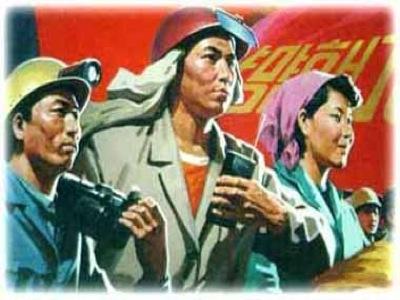Washington’s Corporate Media and the Imperial War on Korea

There is no limit to the slanders spewed by U.S. corporate media – from so-called journalists to filmmakers to comedians – against North Korea, the Democratic Peoples Republic of Korea. “The racist and inaccurate discourse around the DPRK helps justify the almost daily military operations the US backs in South Korea.” The 60-year long propaganda campaign is “part and parcel of the US imperialist agenda to militarize the Asia Pacific.”
The corporate media is the mouthpiece of US imperialism. More specifically, the Hollywood arm of the corporate media is tasked with promoting the US-Western imperialist way of life as profitable “entertainment.” Seth Rogan’s new film fits snugly into this mold. In The Interview, Rogan and James Franco play CIA recruits assigned with the job of assassinating the current leader of the Democratic People’s Republic of Korea (DPRK), Kim Jong-un. This overtly cruel and monstrous plot line should come as no surprise to anyone following US imperialism’s decades long war against Korea.
The Korean War is labeled a “forgotten war” by the US corporate media and political class. In reality, the US imperialist ruling class has done everything it can to erase the stain of the Korean War from popular memory. The US imperialist war on Korea formally began in 1950 after the US violated a temporary (three year) political agreement with the Soviet Union to peacefully divide Korea along the 38th parallel. Instead of abiding by the agreement, the US installed dictator Syngman Rhee in the South and armed it to the teeth at the tune of a half billion US dollars. Rhee used the funds to slaughter hundreds of thousands of guerrilla forces in the North. Despite this, Korean independence and socialist forces counter-attacked and liberated Seoul, the capital of South Korea. Washington, in a scramble to protect its interests in South East Asia from socialist construction and Chinese alliance, agreed to reserve 12 billion dollars for a land invasion in Korea.
During the invasion, the US dropped 420,000 bombs on the capital of the DPRK, Pyongyang. The bombing campaigns left large percentages of Northern Korea without homes or basic infrastructure. More than a million Koreans died. Despite heavy losses, the resistance of the Korean Peoples Army and the socialist Korean Workers Party forced the US into an armistice agreement in 1953. To this day, the US refuses to sign a peace treaty and maintains a militarized presence in the South, where 29,000 US ground troops are currently stationed. The US government also enforces economic sanctions on the DPRK. US sanctions exacerbated the DPRK’s food insecurity crisis in the early 90’s after the destabilization of the Soviet Union and socialist bloc cut off much of the nation’s access to international trade and finance.
US imperialism’s assault on Korea and the DPRK is not a “forgotten war”, but rather, a distorted one. The majority of people in the US obtain knowledge of the DPRK through the lens of the US imperialist corporate media. The Interview is just one of many Hollywood films that have dehumanized the DPRK’s leadership and socialist system in the interests of US empire. The 2004 film Team America: World Police portrayed Kim Jong-il as a literal cockroach whose insecurity fueled ambitions for world domination. In 2012 and 2013, the movies Red Dawn and Olympus Has Fallen each parroted Washington’s image of a militarist North Korea hell-bent on waging war on the US mainland.
To compliment these false and racist depictions of the DPRK, corporate journalism in the US repetitiously reports unverified instances of the DPRK repressing its own people and threatening the US with nuclear war. US imperial slander occurs so often that the fallacies only become more ridiculous. This recently took shape in the US media’s recent report of Kim Jong-un’s supposed mandate that the entire male population of the DPRK cut its hair in Un’s particular style. Of course, such slander never amounts to fact, but rather a politicized gossip partaken by the war-mongering imperialist ruling class and consumed by the rest of us.
Corporate media slander of the DPRK helps fulfill two key objectives for US imperialism. The racist and inaccurate discourse around the DPRK helps justify the almost daily military operations the US backs in South Korea. In contrast to Western media narrative, it is the US’s puppet state in South Korea that conducts regular military exercises, all of which directly or indirectly target the DPRK. In addition to military destabilization, the US corporate media seeks to ideologically erase the heroic victories of Korean socialism. Despite being set ablaze by US bombs during the US invasion of 1950-53 and sanctioned from needed economic assets, the DPRK possesses a growing socialist economy. Housing, education, and healthcare are human rights provided to all. The food insecurity the DPRK experienced in the 90’s has been reduced mightily and the corporate media knows it, as evidenced by its recent avoidance of the issue as a talking point of DPRK demonization.
The US desperately needs to maintain hegemony in the region by keeping Korea divided and disallowing the DPRK to expand political influence in the region through national unity. China’s rise in the east has counterbalanced US imperial power with a more powerful economic system. The destabilization of the DPRK is part and parcel of the US imperialist agenda to militarize the Asia Pacific in an attempt to slow down inevitable crisis and collapse. Corporate media depictions of the DPRK need to be placed within the context of US imperial decline. One of the challenges for the left in this period is to fight the US’s racist narrative of the DPRK, not only for the sake of the Korean people but also for all people struggling to dig the final grave for US imperialism.
Danny Haiphong is an activist and case manager in the Greater Boston area. You can contact Danny at: [email protected].

